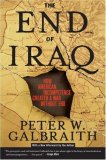Summary | Excerpt | Reviews | Beyond the Book | Readalikes | Genres & Themes | Author Bio

Critics' Opinion:
Readers' Opinion:
First Published:
Jul 2006, 272 pages
Paperback:
Jun 2007, 288 pages
 Book Reviewed by:
Book Reviewed by:
BookBrowse Review Team
Buy This Book
Our vehicles were the only ones heading south. All the other traffic was coming north. Not only were cars and trucks full of people, but most also had suitcases and furniture stacked on the roofs. This was not a good sign.
By the time we approached Dahuk, night had fallen. I listened to the boom of Iraqi artillery as flashes of light from the tracer rounds crossed the sky. Just outside the city we passed a rocky escarpment, and, all of a sudden, the night air was white and smoky. A phosphorous shell had exploded on the road a few seconds before. Karim veered sharply to avoid the fire and smoke.
Inside the city's administration building, I found Jalal Talabani discussing rule of law and minority rights with about seventy city leaders. A teacher asked what would happen to the collaborators with Saddam's regime, making clear his preference for a peremptory approach to justice. Talabani insisted that there had to be a fair trial. An Assyrian asked about religious rights. Talabani replied that the protection of minority religions was an essential part of the program of the Iraqi Kurdistan Front. The back and forth reminded me more of a Vermont town meeting than anything in the Iraq I knew, and as the audience became more engaged -- it was surely the first time they had ever been able to question a leader -- I wondered if I was the only one also hearing the rumble of Iraqi artillery.
Talabani invited me to speak. Perhaps a bit grandiosely, I recalled Woodrow Wilson's promise to the Kurds of their own state, and how pleased I was to be the first American official present on soil governed by the Kurds themselves. As I spoke I was aware that I had nothing concrete to offer these people who clearly were in a dire situation, but they seemed to appreciate my remarks just the same.
After the meeting, we went for dinner to the home of Lizginn Hamzani, a jash commander who had switched sides to support the uprising. We were joined by Sami Abdul Rahman, back in Dahuk for the first time in years; Yacoub Yousif, an Assyrian leader; and Ahmed Barmani, a Kurdish political leader originally from the nearby town of Barmani. Hero Talabani, Jalal's wife, was the only woman present. She had left her young sons with family in London to spend years in remote Kurdistan valleys where she endured the hardships of the peshmerga while assembling -- in her head, on paper, and in photographs -- a record of Iraq's crimes against the Kurds. I was fascinated and horrified by her detailed accounts of Iraqi atrocities. The proximity of the Iraqi Army gave these reports, which included much new information she had gathered since the uprising, an immediacy.
As we dined on a whole lamb, chicken, and an enormous fish, the shelling intensified. In an effort to be reassuring, Ahmed Barmani would tell me that a particular round was Kurdish counterfire, although, in fact, the Kurds had no artillery. At one stage, Hero and I had a discussion of the difficulty of photographing artillery attacks. Yacoub Yousif wanted to take me to Easter Mass in an ancient Assyrian church that had been closed by the regime and reopened after the uprising. As the shelling increased, the Mass kept being postponed, and it was never held.
Jalal Talabani took me upstairs to a child's room to discuss how to respond to an invitation from Saddam to negotiate. "If we have hope for outside help, we will never negotiate. If there is no hope, we cannot refuse to negotiate." I knew that for the Kurds to open a dialogue with Saddam would damage their reputation in the United States, but I could hardly disagree with his assessment. I could see no help on its way.
Well after midnight we left Hamzani's house for another part of Dahuk to spend the night. At 6:15, Ahmed Barmani woke me, softly asking if I was ready to go. A minute later, I was outside in the early morning drizzle. The uprising had collapsed and Iraqi troops were moving into the city. We sped north in our Land Cruisers, passing shuttered shops and empty streets. Once we got on the road to the mountains, the outlines of the catastrophe overtaking the Kurds emerged.
Copyright © 2006 by Peter W. Galbraith





The Funeral Cryer by Wenyan Lu
Debut novelist Wenyan Lu brings us this witty yet profound story about one woman's midlife reawakening in contemporary rural China.
Your guide toexceptional books
BookBrowse seeks out and recommends the best in contemporary fiction and nonfiction—books that not only engage and entertain but also deepen our understanding of ourselves and the world around us.